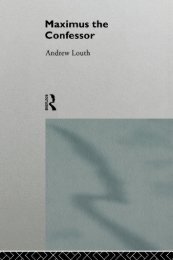Gospels of Thomas and Philip and Truth - Syriac Christian Church
Gospels of Thomas and Philip and Truth - Syriac Christian Church
Gospels of Thomas and Philip and Truth - Syriac Christian Church
Create successful ePaper yourself
Turn your PDF publications into a flip-book with our unique Google optimized e-Paper software.
The <strong>Gospels</strong> endorse John's Baptism in water as signifying repentance <strong>and</strong><br />
cleansing vis-à-vis the Torah, <strong>and</strong> which furthermore is explicitly to be undertaken ‘in<br />
the Name’. Paul, however, sees Baptism as a metaphorical or participatory dying!<br />
• 28. Lk 23:43, Jn 5:24, 8:51, Rev/Ap 20:4-6, Th 1, 18, 19, 111, Ph 43 || I-Thes<br />
4:16-17<br />
Christ teaches that his Disciples will not experience death, regardless <strong>of</strong><br />
martyrdom, whereas Paul writes <strong>of</strong> ‘the dead in Christ’.<br />
• 29. Gen 4:1-5, Mk 15:10 || I-Tim 6:10<br />
Paul claims that the love <strong>of</strong> money is the root <strong>of</strong> all evil; but in the paradigm<br />
cases <strong>of</strong> Cain killing Abel <strong>and</strong> the Chief Priests delivering up the Savior, envy is cited<br />
as the underlying ill. It would seem impossible to attribute the iniquity <strong>of</strong> either Cain<br />
or the Sadducees to mere avarice.<br />
• 30. Mt 5:17-19, 19:16-19, Lk 16:29-31, Ac 21:17-24!!, 4QMMT:C.26b-31¹ || Rom<br />
7:6, Gal 3:10, 5:18<br />
If the entire Torah— the Decalogue in particular, but also the remaining mitzvot<br />
(moral rules) such as Lev 19:18 et passim— is in effect until the sky <strong>and</strong> earth pass<br />
away, then the Mosaic Law is not an obsolete curse from which believers are<br />
absolved. This was the very topic at issue when, after Paul had completed his three<br />
missionary journeys, ‘all <strong>of</strong> the Elders’ (!) in Jerusalem required him to take the<br />
Nazirite vow— to prove his continuing adherence to the Law <strong>of</strong> Moses. (¹‘The works<br />
<strong>of</strong> the Torah ... will be reckoned to you as righteousness’; from the Dead Sea Scroll,<br />
Miqsat Ma‘ase ha-Torah)<br />
• 31. Mt 7:21, 11:2-6!, 19:16-19, 25:31-46, Jn 13:34!, 14:21, 15:10, Jas 2:14-26 ||<br />
Rom 3:28, 10:9, I-Cor 15:35-44<br />
Christ says that one's calling him ‘Lord’ is not enough, but rather that the<br />
Disciple's total obedience is dem<strong>and</strong>ed; both the OT <strong>and</strong> the <strong>Gospels</strong> require<br />
adherence to a plenitude <strong>of</strong> divine comm<strong>and</strong>ments, with resultant fruitful deeds.<br />
Indeed, it was precisely by his works— <strong>and</strong> not merely by his faith— that Christ<br />
proved his own authority to John the Baptist! Paul on the other h<strong>and</strong> states that a<br />
simple confession <strong>of</strong> faith, along with a belief in Christ's (merely spiritual, not<br />
corporeal) resurrection, suffices— a thoroughly antinomian doctrine. (This subject<br />
must be carefully distinguished from that <strong>of</strong> forgiveness— both among humans <strong>and</strong><br />
between God <strong>and</strong> humankind— as a pre-eminently innovative tenet in the <strong>Gospels</strong>.<br />
For <strong>of</strong> course absolution logically presupposes a transgression <strong>of</strong> the rules, not their<br />
132




